Why is Farage's Brexit Party leading the polls and what is its plan for the UK?
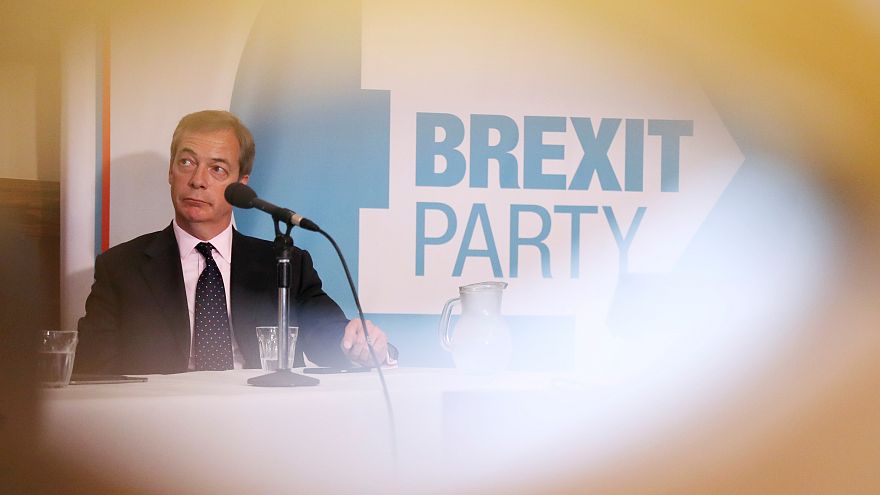
DAILY EXPRESS - Copyright REUTERS/Simon Dawson - 23 May 2019
Brexit was voted for but hasn’t happened. Britain’s ruling Conservative government has failed to deliver it. The Labour opposition can’t agree on whether it wants it or not. Parliament is deadlocked.
The political vacuum has been happily filled by a familiar face who played a major role in bringing about the EU referendum in 2016, and the outcome.
Nigel Farage’s Brexit Party has been surging ahead in opinion polls in the run-up to the European Parliament elections. This is despite the fact that the party is only weeks old and has no detailed policies.
Here are the projected results according to the polls.
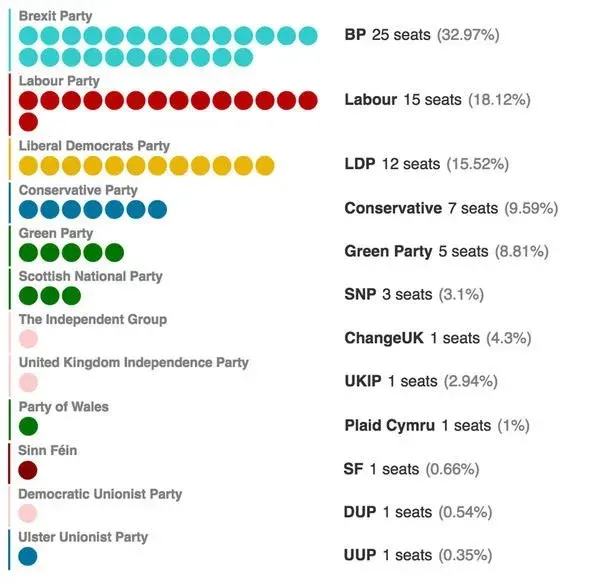
It’s thought a successful result for the new party could push Britain’s ruling Conservative government to pursue a harder Brexit. The UK is now due to leave the EU on October 31.
Farage’s objectives go beyond getting the UK out of the EU. The veteran Eurosceptic now says he also wants “to change politics for good.”
The European vote has given Nigel Farage a perfect opportunity to tap into idespread public anger at the Brexit delay and the parliamentary paralysis. Nearly three years after the referendum, these are the elections the UK was not expected to fight.
Amid the political turmoil, public opinion has polarised still further. Just as pro-EU supporters have been emboldened in their opposition to Brexit, anti-EU and English nationalist sentiment has hardened too.
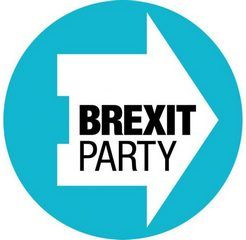
Farage has successfully established clear blue water between his new movement and the UK Independence Party he once led. Since he left, UKIP has had several leaders and has openly flirted with the far-right.
In contrast, Brexit Party enthusiasts highlight the diversity of its candidates, who include people from a variety of ethnic, social and political backgrounds.
But there is little doubt that for many people, much of its appeal is down to the charisma of its leader and his message.
Despite the anger and frustration, Brexit Party events have been rather joyous, festive occasions. Halls and stadiums have been packed. People attending have said they feel “let down” by the two main parties, “sick” of being misrepresented by “remainers”, and that the failure to implement the Brexit vote is “threatening democracy”.
Both the main parties are feeling the heat, suffering badly in recent local elections. A survey of Conservative Party members found 60 percent were planning to vote for Brexit Party candidates at the European ballot. The Labour opposition’s ambiguous stance on Brexit has dented its appeal to voters on both sides of the divide.
Many at the rallies, but by no means all, are middle-aged or older – while the Brexit Party is forecast to do well in more affluent districts as well as working-class areas, particularly in England.
It attracts support from both the right and left. Audiences in traditional Labour strongholds have warmly applauded Ann Widdecombe, a Brexit Party convert who made her career on the right of the Conservative Party.
READ: Support for new Brexit Party surges amid voter backlash
READ: Brexit Guide: where are we now?
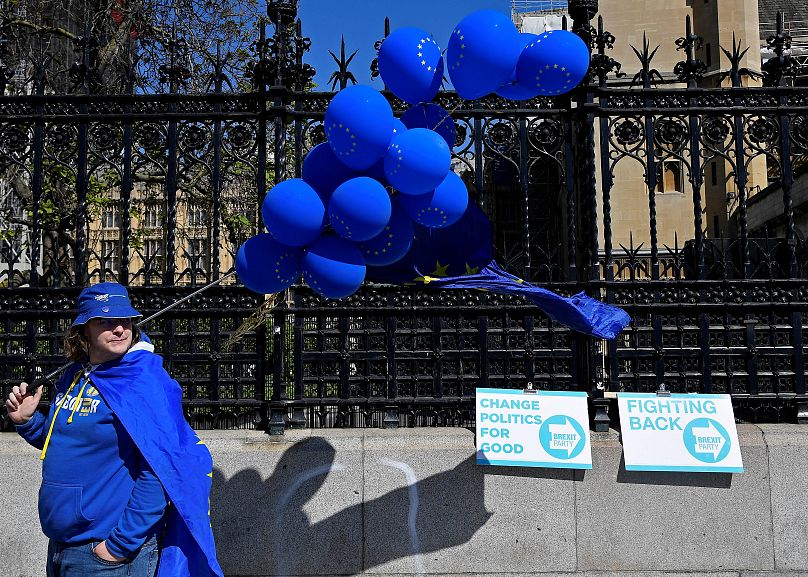
Where in the past political parties have been pilloried for vagueness, Nigel Farage has made a virtue of his lack of a detailed programme. The Brexit Party has no manifesto, he says, because “manifesto equals lie”.
“We will talk about all those things after the 23 May,” he said recently. “Right now… we are fighting and campaigning to make sure that we can be a free, independent, self-governing, democratic nation.”
The European Union is no longer even his main theme. In a Brexit Party election broadcast, the EU isn’t even mentioned until towards the end. Instead, candidates describe how they feel “betrayed” and “humiliated” by politicians, leaving democracy “under threat”.
“Our task and our mission is to change politics for good, to change all aspects of politics in this country,” Farage told the campaign launch. So far there are few details of what that means.
Polls suggest that many who voted to leave the EU have been increasingly lured by a “no deal” Brexit – a departure without any agreement on the withdrawal terms or future relations.
Its advocates have increasingly pushed for a clear break from the EU to trade on World Trade Organisation (WTO) terms.
“The only way we can deliver the democratic will of the people is to leave on WTO terms,” Farage told the BBC. “Once we do that, the European Union will be banging our door down to have a sensible, tariff-free deal.”
The UK could leave the EU and then negotiate new arrangements afterwards, he said in a recent TV interview.
Farage’s claim that he argued for a no deal Brexit before the EU referendum is disputed.
What would ‘leaving on WTO terms’ mean?
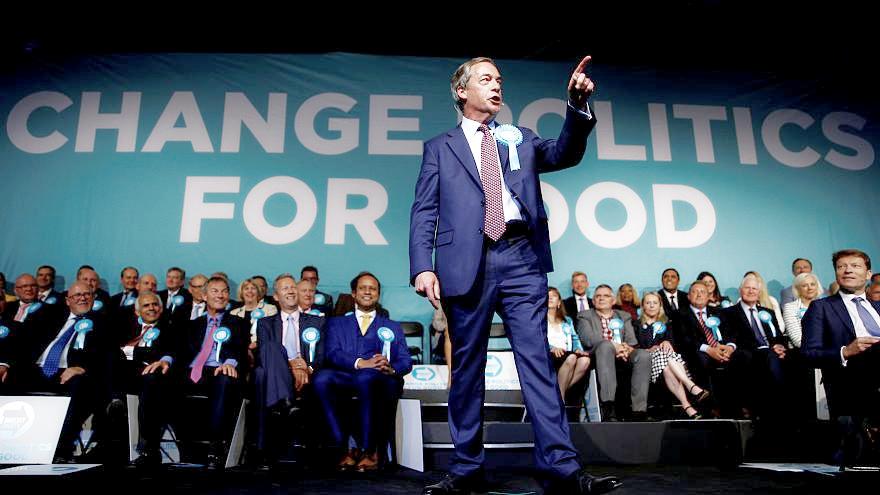
Pro-Brexit economists and politicians argue that as most global trade is done on WTO terms, the UK could open up to the world while still maintaining access to EU markets.
The counter-argument – expressed by many other economists, business groups and politicians – is that a “no deal” Brexit would be an act of reckless folly, causing immediate disruption and damaging the economy.
They contest Farage’s claim that the EU would quickly strike a free-trade deal with the UK. The British government says the EU would treat the UK as “a third country”.
The EU is the UK’s largest trading partner. By quitting the single market and customs union, Britain would be free to implement its own trade policy.
But in the absence of a deal with the EU it would also face new barriers such as tariffs and regulations. Dozens of EU trade agreements with non-EU countries would no longer apply to the UK.
Analysts and British economic sectors reliant on close, smooth arrangements with Europe have warned that being forced to adapt to new rules overnight brings dangers. Among those sounding alarm bells are manufacturing industries – including the car, food, chemicals and pharmaceuticals – as well as the health service, tourism, and financial services. There have also been warnings over farming and fishing – despite strong support for Brexit from within these two sectors.
Ann Widdecombe – a Brexit Party candidate for southwest England – dismissed fears that Devon farmers may be put out of business as “project fear mark two”.
Nigel Farage has argued that the UK could slash tariffs on imports, helping poorer people by making food and clothes cheaper. Such claims have also been disputed by commentators and economists.
The Brexit Party leader also rejects fears that a no-deal Brexit would lead to extra delays at borders, saying tariffs could be logged online and on mobile phones. “Business finds a way through every different situation,” The Guardian quoted him as saying.
A UK-EU free trade deal would render the Irish border “a non-issue”, Farage has claimed, because there would be no excise duties to collect and any future differences in specification could be easily dealt with.
He also believes a hard border should not be necessary because Northern Ireland and the Irish Republic already manage without one, despite different currencies and tax rates.
Many trade experts and Brexit analysts reject the repeated denials among some Brexiteers that the Irish border problem is real, as well as their suggested solutions.
READ:No-deal Brexit: what would 'WTO terms' mean for UK-EU trade?
READ: No-deal Brexit: everything you need to know?
What about areas other than trade?

If the UK left the EU with no deal on the terms, existing legal arrangements would abruptly cease to apply. It would affect many aspects of everyday life – from travel between the UK and the EU, to security, crime and terrorism.
The government’s most senior civil servant has warned that a no deal Brexit would lead to a recession and price rises, and harm Britain's security apparatus and legal system.
Nigel Farage argues that a no deal Brexit would allow the UK to “make its own laws, have its own courts and control its own borders”.
He has repeatedly argued for EU nationals who moved to the UK before Brexit to be able to stay – but he has criticised the British government’s plans for citizens' rights in the event of no deal.
EU countries and the UK have both moved to secure the rights of citizens on both sides of the English Channel in such a scenario, but campaigners have warned they will be watered down.
READ: What would a no-deal Brexit mean for citizens’ rights – EU and UK expats?
READ: How would a no-deal Brexit affect travel and consumers?
“America’s always a few years ahead of us,” Nigel Farage said recently.
He has long praised Donald Trump, while the US president has suggested that his British admirer should be the UK’s ambassador to the US.
The Brexit Party leader has not expressed the same level of hostility to mainstream media – although one commentator saw similarities with Trump in Farage’s recent interview with the BBC, which he described as “the enemy”.
Interviewer Andrew Marr revisited Farage’s past comments on health service privatisation, climate change, gun control, immigration, and Russian President Vladimir Putin. The Guardian has also highlighted past interviews with a far-right US talk show.
Like Trump, he has long accused elites of looking after their own interests and betraying the people. Former British Prime Minister Tony Blair said recently that far from draining the swamp of politics, Farage and his associates were “the people who created the swamp”.
The Brexit Party does not openly advocate Trump-like tactics. Election candidate Alexandra Phillips has called for a positive response to “remainers’ slurs and smears” by highlighting the “many moral arguments for Brexit”.
After the 2016 EU referendum, Nigel Farage left frontline politics. Now back with a mission to complete an unfinished job, he has vowed to harden his stance.
“I did say if I ever had to come back into the political spectrum, there’d be no more Mr Nice Guy,” he said at his new party’s campaign launch. “And I mean it. I’m angry about what’s happened.”
WHO and WHAT is behind it all ? : >
The bottom line is for the people to regain their original, moral principles, which have intentionally been watered out over the past generations by our press, TV, and other media owned by the Illuminati/Bilderberger Group, corrupting our morals by making misbehavior acceptable to our society. Only in this way shall we conquer this oncoming wave of evil.
Commentary:
Administrator
HUMAN SYNTHESIS
All articles contained in Human-Synthesis are freely available and collected from the Internet. The interpretation of the contents is left to the readers and do not necessarily represent the views of the Administrator. Disclaimer: The contents of this article are of sole responsibility of the author(s). Human-Synthesis will not be responsible for any inaccurate or incorrect statement in this article. Human-Synthesis grants permission to cross-post original Human-Synthesis articles on community internet sites as long as the text & title are not modified.
The source and the author's copyright must be displayed. For publication of Human-Synthesis articles in print or other forms including commercial internet sites. Human-Synthesis contains copyrighted material the use of which has not always been specifically authorized by the copyright owner. We are making such material available to our readers under the provisions of "fair use" in an effort to advance a better understanding of political, economic and social issues. The material on this site is distributed without profit to those who have expressed a prior interest in receiving it for research and educational purposes. If you wish to use copyrighted material for purposes other than "fair use" you must request permission from the copyright owner.
TILBAKE TIL HOVEDMENYEN - BACK TO THE MAIN MENU